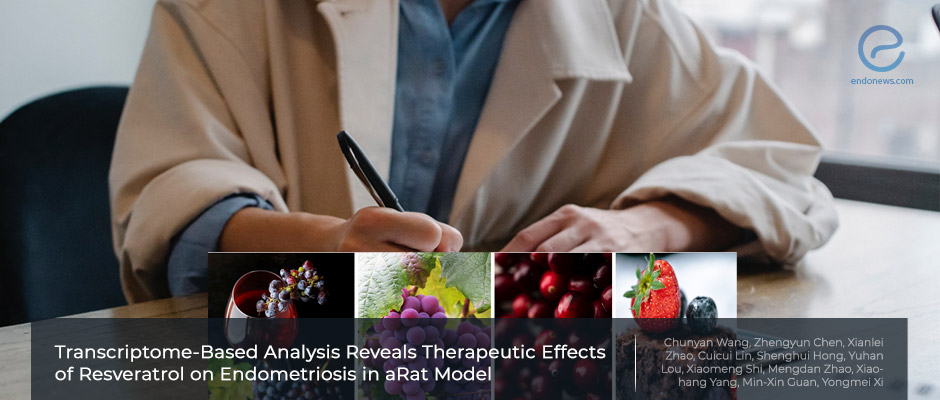Resveratrol for endometriosis
Nov 18, 2021
Resveratrol alters inflammatory, immunologic, and lipid metabolism genes in mice and causes shrinkage in endometriosis.
Key Points
Highlights:
- The study analyses the possible reason for the effect by showing the transcriptomic changes on endometriotic lesions after resveratrol application.
Importance:
- Resveratrol seems to be effective on endometriosis. This information also helps to reveal the underlying mechanisms.
What's done here:
- Fifty female rats have been prepared as an endometriosis autotransplantation model. Resveratrol was applied intraperitoneally.
- Endometriosis group, medium or high resveratrol dose groups, and the control groups with the Sham-operation (saline and without endometriosis), 10 rats for each group.
- At the end of the treatment, all mice have undergone a glucose tolerance test, insulin tolerance test before being euthanized.
- RNA-seq, Quantitative Real-Time Polymerase Chain Reaction (RT-PCR) analysis, macrophage typing, and adipocyte size measurement have been applied from the lesions.
Key Results:
- The lesion sizes have decreased significantly in the high concentration resveratrol group compared to the control endometriosis group.
- The glucose tolerance, macrophage polarization, and adipocyte sizes between the treated model rats and control rats have differed significantly.
- Transcriptional analysis showed that resveratrol alters the PPAR, insulin resistance, MAPK, and PI3K/Akt signaling pathways.
- PPAR activation, macrophage polarization for antiinflammation, and lipid metabolism change in favor of adipocyte cell shrinkage while resulting in a decrease in insulin resistance.
Limitations:
- The sample size is small for trusting in the results of a transcriptomic analysis.
- The metabolism linked to adipocytes and endometriosis should be studied in a further study before concluding on the possible relations.
Lay Summary
Endometriosis has been studied previously about its inflammatory nature and its tendency for causing macrophage disfunction.
In the study conducted by Chunyan Wang et al, the researchers analyzed the effect of a flavonoid, "resveratrol" on endometriosis lesions and the mechanism underlying these functions by applying RNAseq and transcriptomic analysis. They studied female rats with an endometriosis autotransplantation model by applying resveratrol intraperitoneally for 28 days.
Mice were divided into 5 groups, endometriosis group, medium or high resveratrol dose groups, and the control groups with the Sham-operation (saline and without endometriosis), 10 rats for each group. At the end of the treatment, all mice underwent glucose tolerance test and insulin tolerance test before being euthanized. Later, RNA-seq, Quantitative Real-Time Polymerase Chain Reaction analysis, macrophage typing, and adipocyte size measurement have been applied from the lesions.
The results showed a significant decrease in the size of endometriosis of the high concentration resveratrol group in comparison to the control endometriosis group. The glucose tolerance, macrophage polarization, and adipocyte sizes between the treated model rats and control rats have differed significantly. Transcriptional analysis showed that resveratrol alters the PPAR, insulin resistance, MAPK, and PI3K/Akt signaling pathways. When PPAR got activated, the macrophage ratio altered in the route for antiinflammation and lipid metabolism changed in favor of adipocyte cell shrinkage while resulting in a decrease in insulin resistance.
The authors concluded that resveratrol treatment has the potential to become a possible treatment agent for endometriosis depending on the highlighted metabolic effects, but suggested further studies considering the low numbers of animals used in the study. This article was published in the recent issue of the journal named "Drug Design, Development and Therapy".
Research Source: https://pubmed.ncbi.nlm.nih.gov/34616146/
resveratrol endometriosis antioxidant macrophage

